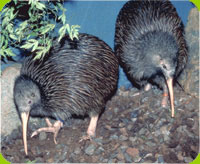Behavior
Brown kiwis are nocturnal, meaning they are most active at night. During the day, they sleep in dens or burrows. They are monogamous, meaning they mate with only one partner during one or more breeding seasons. They live in pairs and are territorial, meaning they are protective of an area they consider home and claim exclusively for themselves. A brown kiwi pair's territory ranges from 12 to 106 acres (5 to 43 hectares).
 During the breeding season, the female lays one or two eggs in a nest made in thick vegetation. The male incubates the eggs, meaning he sits on them to keep them warm so the embryos inside can develop and hatch. The incubation period is about ninety days. The brown kiwi has no economic significance for humans. It is a protected species in New Zealand and the government has established a recovery program for them, including captive breeding and establishing sanctuaries.
During the breeding season, the female lays one or two eggs in a nest made in thick vegetation. The male incubates the eggs, meaning he sits on them to keep them warm so the embryos inside can develop and hatch. The incubation period is about ninety days. The brown kiwi has no economic significance for humans. It is a protected species in New Zealand and the government has established a recovery program for them, including captive breeding and establishing sanctuaries.
Kiwi nests are usually located in well established burrows where the surrounding foliage has had time to grow up and thoroughly conceal the entrance. The female Brown Kiwi lays 1 or 1 glossy white eggs of prodigious size, 14-20 percent of her body weight. Producing such a large and energy rich (more than 60 percent yolk) egg depletes the females energy reserves. There is a period of 25 to 30 days between the laying of the first and second egg. It is entirely understandable that she leaves the male alone in the nest burrow to handle the 70- to 80-day incubation by himself.
Kiwi chicks have no egg tooth and must use their feet to kick their way out of the shell. A newly hatched kiwi looks like a mini replica of the adult, at 1/8 adult size. They are precocial chicks, able to forage for themselves with only minimal paternal supervision for their first few days of life. Although completely independent by two weeks of age, they do no reach adult size until they are 18 to 20 months old.


